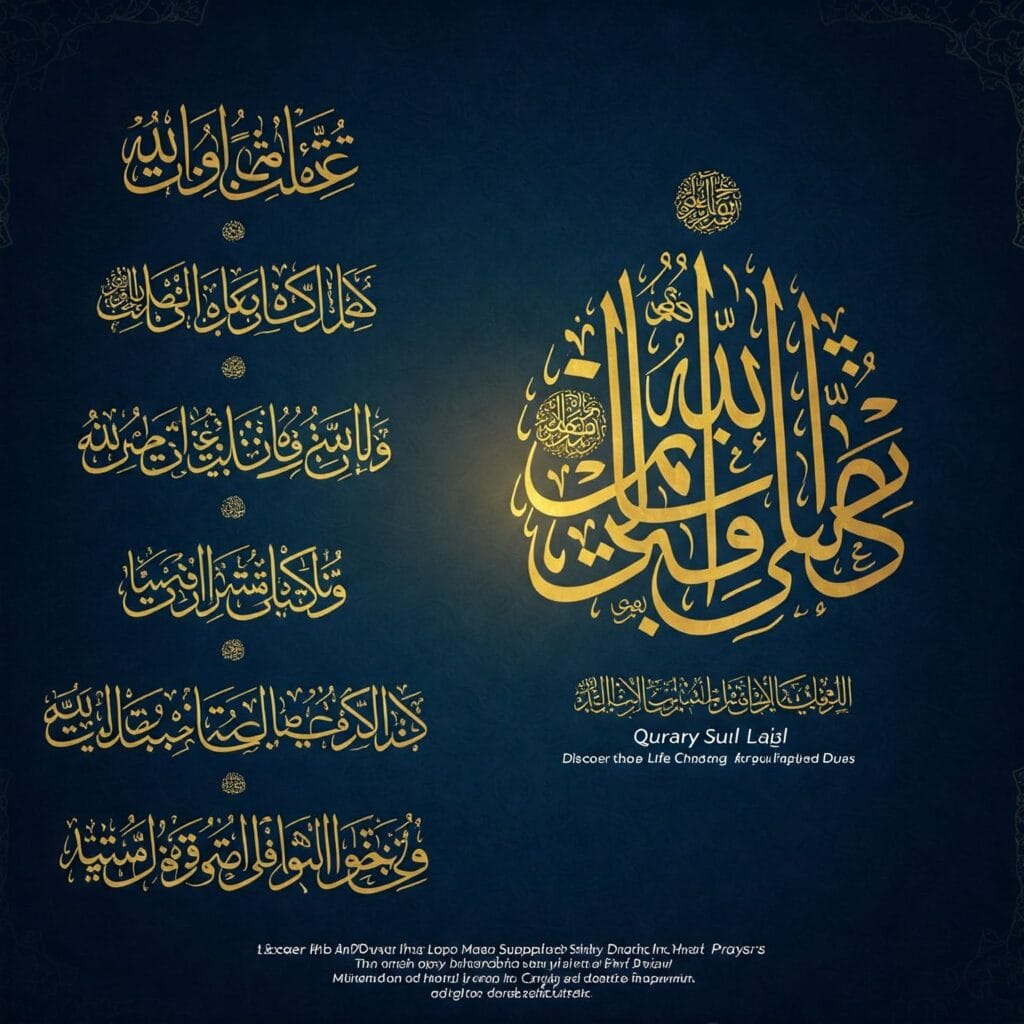Duas (supplications) in Islam are heartfelt prayers that connect believers directly with Allah, serving as a powerful means of seeking guidance, mercy, and transformation. Rooted in the Quran, the divine revelation received by the Prophet Muhammad (peace be upon him), these supplications offer spiritual, emotional, and practical solutions for life’s challenges. In 2025, as individuals navigate complexities like stress, uncertainty, and global change, Quranic duas provide a timeless source of hope, resilience, and personal growth. This in-depth article explores key Quranic duas that can transform lives, delving into their meanings, contexts, prophetic applications, and practical benefits. By examining theological foundations, addressing misconceptions, and highlighting contemporary practices, we aim to illuminate how these supplications can foster profound change in the hearts and lives of Muslims worldwide.

Theological Foundations of Quranic Duas
The Power of Dua in the Quran
The Quran emphasizes dua as a direct line to Allah, affirming its transformative potential:
“And your Lord says, ‘Call upon Me; I will respond to you…’” [Ghafir 40:60]
This verse underscores dua as an act of worship and a promise of divine response, encouraging believers to seek Allah’s help in all matters. Another key verse highlights dua’s role in drawing closer to Allah:
“And when My servants ask you concerning Me, indeed I am near. I respond to the invocation of the supplicant when he calls upon Me…” [Al-Baqarah 2:186]
This intimacy fosters emotional and spiritual transformation.
Dua as a Means of Change
The Quran presents dua as a tool for personal and communal transformation, addressing needs from guidance to protection:
“Our Lord, give us in this world [that which is] good and in the Hereafter [that which is] good and protect us from the punishment of the Fire.” [Al-Baqarah 2:201]
This dua encapsulates a holistic prayer for well-being, reflecting the Quran’s comprehensive approach to life’s aspirations.
Key Quranic Duas and Their Transformative Impact
1. Dua for Guidance and Righteousness
Dua: “Our Lord, grant us from Yourself mercy and prepare for us from our affair right guidance.” [Al-Kahf 18:10]
- Context: Recited by the Youth of the Cave, this dua seeks divine guidance during persecution, symbolizing trust in Allah amidst uncertainty.
- Transformation: It fosters clarity in decision-making and strengthens faith, helping believers navigate moral dilemmas in 2025’s complex world.
- Prophetic Example: The Prophet often sought guidance, as in the dua for istikhara (Sahih al-Bukhari 1166), aligning with this Quranic principle.
Application: Recite this dua before major decisions, like career choices or relationships, to seek divine clarity and peace.
2. Dua for Patience and Resilience
Dua: “Our Lord, pour upon us patience and let us die as Muslims [in submission to You].” [Al-A’raf 7:126]
- Context: Spoken by the magicians who believed in Prophet Musa, this dua reflects steadfastness under oppression.
- Transformation: It builds emotional resilience, helping individuals endure trials like financial stress or loss with sabr (patience).
- Prophetic Example: The Prophet recited similar supplications during the Meccan boycott (Sahih al-Bukhari 3859), embodying sabr.
Application: Use this dua during hardships, paired with mindfulness practices, to cultivate inner strength and spiritual submission.
3. Dua for Protection from Harm
Dua: “Our Lord, we have wronged ourselves, and if You do not forgive us and have mercy upon us, we will surely be among the losers.” [Al-A’raf 7:23]
- Context: Recited by Prophet Adam and Hawwa after their mistake, this dua seeks forgiveness and protection from spiritual harm.
- Transformation: It promotes self-awareness, repentance, and emotional healing, freeing individuals from guilt and shame.
- Prophetic Example: The Prophet taught dua for forgiveness, like “Astaghfirullah” (Sahih Muslim 2702), echoing this verse.
Application: Recite this dua after mistakes or during nightly reflection to seek forgiveness and restore mental peace.
4. Dua for Knowledge and Wisdom
Dua: “My Lord, increase me in knowledge.” [Taha 20:114]
- Context: Revealed to the Prophet Muhammad, this dua emphasizes the pursuit of knowledge as a divine gift.
- Transformation: It enhances intellectual growth and decision-making, crucial in 2025’s knowledge-driven society.
- Prophetic Example: The Prophet’s emphasis on seeking knowledge (Sunan Ibn Majah 224) aligns with this dua’s intent.
Application: Recite before studying, working, or teaching to boost focus and wisdom, complementing academic efforts.
5. Dua for Inner Peace and Tranquility
Dua: “Our Lord, forgive us our sins and the excess [committed] in our affairs and plant firmly our feet and give us victory over the disbelieving people.” [Aal-E-Imran 3:147]
- Context: Recited by believers during trials, this dua seeks forgiveness, stability, and strength.
- Transformation: It fosters sakina (tranquility) and emotional balance, countering anxiety and stress.
- Prophetic Example: The Prophet’s dua for calm, “Allahumma ij’al fi qalbi nooran” (Sahih Muslim 771), complements this prayer.
Application: Recite during moments of anxiety or conflict, using apps like MyDua for guided practice, to restore calm.
6. Dua for Comprehensive Well-Being
Dua: “Our Lord, give us in this world [that which is] good and in the Hereafter [that which is] good and protect us from the punishment of the Fire.” [Al-Baqarah 2:201]
- Context: Recited during hajj or daily life, this dua seeks holistic success and protection.
- Transformation: It aligns priorities with divine wisdom, promoting balance in spiritual, emotional, and material pursuits.
- Prophetic Example: The Prophet encouraged this dua for its comprehensive scope (Sahih al-Bukhari 4522).
Application: Incorporate into daily prayers or after salat to seek balanced success and divine protection.
Prophetic Guidance on Dua
The Prophet Muhammad (peace be upon him) emphasized dua’s transformative power:
- Sincerity and Presence: He said, “Call upon Allah while being certain of being answered…” [Jami’ at-Tirmidhi 3479], highlighting ikhlas (sincerity) for impactful supplication.
- Regular Practice: He taught daily adhkar, like morning and evening duas (Sahih al-Bukhari 6306), ensuring constant connection with Allah.
- Community Dua: The Prophet led collective supplications, as after salat (Sahih Muslim 677), fostering communal healing and unity.
Practical Benefits of Quranic Duas
Emotional Healing
Duas like Al-A’raf 7:23 (forgiveness) and Aal-E-Imran 3:147 (tranquility) alleviate guilt, anxiety, and stress, promoting mental peace, as supported by Ar-Ra’d 13:28.
Spiritual Growth
Regular dua, as in Taha 20:114 (knowledge), strengthens iman (faith) and taqwa (God-consciousness), aligning with Ghafir 40:60’s call to worship.
Decision-Making Clarity
Duas like Al-Kahf 18:10 (guidance) provide focus, helping navigate 2025’s complexities, from career choices to ethical dilemmas.
Resilience and Hope
Duas like Al-A’raf 7:126 (patience) build sabr, empowering individuals to face trials with optimism, per Al-Baqarah 2:153.
Common Misconceptions and Clarifications
Misconception 1: Duas Guarantee Instant Results
Myth: Every dua is answered immediately as requested. Clarification: Ghafir 40:60 promises a response, but Allah may answer differently—granting, delaying, or substituting for the best outcome (Sahih al-Bukhari 6340).
Misconception 2: Duas Replace Action
Myth: Supplication alone solves problems without effort. Clarification: The Prophet combined dua with action, like tying his camel (Jami’ at-Tirmidhi 2517). Duas complement effort, per At-Talaq 65:3.
Misconception 3: Only Arabic Duas Are Valid
Myth: Duas must be in Arabic to be effective. Clarification: While Quranic duas are in Arabic, personal supplications in any language are valid, as Allah knows all intentions (Sahih Muslim 2670).
Misconception 4: Duas Are for Major Issues Only
Myth: Dua is reserved for significant problems. Clarification: The Prophet encouraged dua for all needs, even small ones like a shoelace (Jami’ at-Tirmidhi 3602), per Al-Baqarah 2:186.
Contemporary Contexts in 2025
Global Practices
- Digital Tools: Apps like MyDua, Athan, and Sabr offer guided Quranic duas, helping users memorize Al-Baqarah 2:201 or Taha 20:114, enhancing daily practice.
- Mental Health Integration: Islamic centers like the Khalil Center in the US incorporate duas (e.g., Aal-E-Imran 3:147) into therapy, addressing anxiety and depression.
- Youth Engagement: Muslim youth in the UK and Canada create social media content on duas like Al-Kahf 18:10, promoting guidance in modern challenges.
- Community Programs: Mosques in Malaysia and South Africa host dua workshops post-salat, fostering collective supplication, per Sahih Muslim 677.
Challenges
- Cultural Misuse: Some communities rely on amulets over Quranic duas, contrary to Ghafir 40:60. Scholars via IslamQA clarify authentic practices.
- Skepticism: Secular influences question dua’s efficacy. Campaigns by Yaqeen Institute highlight Al-Baqarah 2:186’s promise of divine response.
- Time Constraints: Busy lifestyles limit dua practice. Apps and short duas like Taha 20:114 offer accessible solutions.
Practical Steps to Incorporate Quranic Duas
To transform your life with Quranic duas, consider:
- Memorize Key Duas: Learn Al-Baqarah 2:201 and Taha 20:114 using Quran.com or MyDua, reciting daily for comprehensive benefits.
- Set Dua Routines: Incorporate duas into morning/evening adhkar, per Sahih al-Bukhari 6306, using apps like Athan for reminders.
- Reflect on Meanings: Study tafsir of Al-Kahf 18:10 via Shaykh Yasir Qadhi’s lectures to deepen sincerity, per Jami’ at-Tirmidhi 3479.
- Combine with Action: Pair Al-A’raf 7:126 with practical steps, like seeking therapy or planning, reflecting Jami’ at-Tirmidhi 2517.
- Join Community Duas: Attend mosque dua sessions or online groups via Rabata, aligning with Al-Ma’idah 5:2’s call for collective righteousness.
- Personalize Supplications: Add personal requests in any language after Quranic duas, per Sahih Muslim 2670, for relevance.
- Track Progress: Journal dua outcomes, inspired by Al-Baqarah 2:186, to recognize divine responses and build tawakkul.
- Educate Others: Share duas like Aal-E-Imran 3:147 with family, using resources from Islamic Relief, to spread transformation.
Conclusion
Quranic duas are a divine gift, offering transformative power to reshape lives through connection with Allah. Verses like Al-Baqarah 2:186, Al-Kahf 18:10, and Taha 20:114 provide guidance, resilience, and peace, addressing 2025’s challenges from stress to uncertainty. The Prophet’s teachings, emphasizing sincerity and regular dua, bring these supplications to life. Modern tools, community programs, and integrated therapies amplify their impact, despite challenges like cultural misuse. By embracing these duas with intention and action, Muslims can unlock spiritual growth, emotional healing, and practical success, fulfilling the Quranic promise:
“Call upon Me; I will respond to you…” [Ghafir 40:60]
Must real:
- Unlock the Soothing Power: Quran Peace Restores Your Heart with Radiant Inner Healing!
- Unleashing the Revolutionary Spirit: Quranic Freedom Ignites Critical Thought for a Brighter Future!
- Unlock the Supreme Power of Istikhara’s Divine Guidance to Transform Your Life’s Toughest Decisions!
Frequently Asked Questions (FAQs)
u003cstrongu003eWhat makes Quranic duas transformative?u003c/strongu003e
Duas like Al-Baqarah 2:201 connect believers to Allah, fostering spiritual, emotional, and practical change, per Ghafir 40:60.
u003cstrongu003eDo duas always get answered?u003c/strongu003e
Allah responds (Ghafir 40:60), but answers may be delayed, altered, or better than requested, per Sahih al-Bukhari 6340.
u003cstrongu003eMust duas be in Arabic?u003c/strongu003e
u003cbru003eQuranic duas are in Arabic, but personal supplications in any language are valid, per Sahih Muslim 2670.
u003cstrongu003eCan duas replace effort?u003c/strongu003e
No, duas complement action, as the Prophet acted while supplicating (Jami’ at-Tirmidhi 2517).
u003cstrongu003eWhich dua is best for guidance?u003c/strongu003e
Al-Kahf 18:10 seeks divine guidance, ideal for decisions, paired with istikhara (Sahih al-Bukhari 1166).
u003cstrongu003eHow do duas help mental health?u003c/strongu003e
Duas like Aal-E-Imran 3:147 promote tranquility, reducing anxiety, per Ar-Ra’d 13:28.


Post Comment